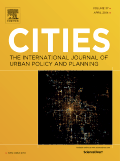Creative Cities and the recession
Andy has a new publication. Written with Tom Hutton from UBC, Canada it analyses the relationship between the recession on the cultural economy.
Andy and Tom, and Mike Indergaard also co-edited the whole of the Special issue of the journal Cities.
This special issue grew out of comments generated by Andy’s 2009 paper “,The creative and cultural economy and the recession.” Geoforum 40(4): 495-496.
Andy,Tom and Mike subsequently organised a special session at the International Sociological Association annual meeting in Gothenburg, and they put together the special issue based on those contributors.
Indergaard, M., Pratt, A., & Hutton, T. A. (2013). “Creative cities after the fall of finance.” Download cities.editorial .pdf‘, Cities. DOI: http://dx.doi.org/10.1016/j.cities.2012.09.007 Cities 33(0): 1-4.
Pratt, A. C., & Hutton, T. (2013). “Reconceptualising the relationship between the creative economy and the recession: learning from the financial crisis” Download: Cities.Final.pdf, Cities. DOI: http://dx.doi.org/10.1016/j.cities.2012.05.008 Cities 33(0): 86-95
This paper uses the financial crisis as an opportunity to examine a number of key questions about the relationship of the creative economy and the city. We argue that weak conceptualisation of the nature of the relationship between the creative economy and the city, as well as a lack of clarity about what the creative economy is, has subverted debates about this important topic. This paper comprises four major sections: the first introduces the field of the creative economy, the second section seeks to clarify what exactly we mean by the term financial crisis; here we highlight the multifaceted character of the financial crisis and is variable impacts across the field of the creative economy. The third part outlines the range and diversity of the actually existing relations between the creative economy and the city. In the fourth section we reflect upon the earlier argument to consider what we can learn about the impacts (actual and expected) of the financial crisis on the creative economy and the city, and additionally to reflect upon what this might indicate about the changing and perhaps transformed relationship between the creative economy and the city in the last quarter century.
